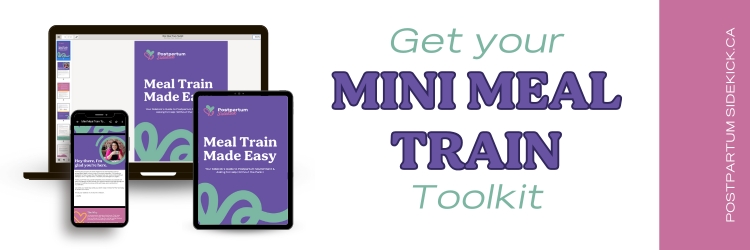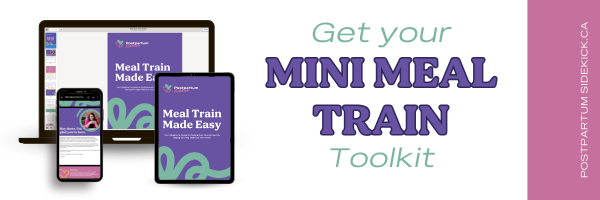(And How to Build a Meal Train That Nourishes You in Every Way)
Growing and birthing a baby is no small feat — and neither is the recovery that follows.
Postpartum nutrition isn’t about “bouncing back” or following a perfect diet. It’s about nourishment. It’s about rebuilding strength, supporting mental health, and giving your body the fuel it needs to heal.
Up to 1 in 5 birthing parents experience postpartum depression, and research shows that nutritional deficiencies — especially in iron, omega-3s, and B12 — can contribute.
Postpartum bodies need care, too.
Growing, birthing, and feeding a baby takes a lot out of you—literally. It’s a major nutritional event, and many parents don’t realize that the toll can last for up to two years after birth.
Without enough time, nourishment, or support to truly recover, it’s common to experience something called postpartum depletion. It can show up as exhaustion, brain fog, mood changes, or just feeling like you’re running on empty.
Some of the nutrients most often depleted after birth include:
- Iron – low levels can lead to fatigue and even depression
- Vitamin D & B12 – essential for your nervous system, energy, and immunity
- Omega-3s like DHA – support brain health and reduce the risk of postpartum depression
- Zinc & Magnesium – help with stress, mood regulation, and better sleep
But nutrients aren’t the only thing that fuel recovery—community does, too.
We know that social support plays a huge role in perinatal mental health. Having a circle of people to lean on—whether they bring food, hold the baby while you shower, or simply ask how you’re doing—can reduce the risk of postpartum depression and anxiety, increase confidence, and lead to more positive postpartum experiences.
But food doesn’t just magically appear in the fridge without effort. Asking for help can feel awkward. That’s why I created a Mini Meal Train Toolkit – to help you take one big task off your plate, so you can focus on rest, recovery, and bonding with your baby.

In this free toolkit, you’ll get:
- A simple guide to building a meal train that actually works
- Tips on how to ask for help — especially from your middle and outer circle of support (think: co-workers, neighbours, aunts)
- 2 delicious recipes to share with your circles of support or to make on your own.
- Gentle email scripts and social media blurbs you can use to make your ask with ease
Parents who receive practical support like meals are significantly more likely to report positive postpartum mental health outcomes.
Whether you’re pregnant, freshly postpartum, or planning ahead for someone you love, this toolkit will help you build a circle of support that nourishes the whole parent — body, mind, and heart.
Get Your Free Toolkit
Sign up for my monthly newsletter and receive the Mini Meal Train Toolkit straight to your inbox.
You’re not meant to do this alone. Let’s build your village — one delicious dish at a time.
References:
Bodnar LM, Wisner KL. Nutrition and depression: implications for improving mental health among childbearing-aged women. Biol Psychiatry. 2005 Nov 1;58(9):679-85.
Ellsworth-Bowers, E.R. and E. J. Corwin. E.J. Nutrition and the psychoneuroimmunology of postpartum depression. Nutr Res Rev. 2012 June ; 25(1): 180–192.
Ghaedrahmati M, Kazemi A, Kheirabadi G, Ebrahimi A, Bahrami M. Postpartum depression risk factors: A narrative review. J Edu Health Promot 2017;6:60.
Mocking RJT, Steijn K, Roos C, et al. Omega-3 fatty acid supplementation for perinatal depression: a meta-analysis. J Clin Psychiatry. 2020;81(5):19r13106.

